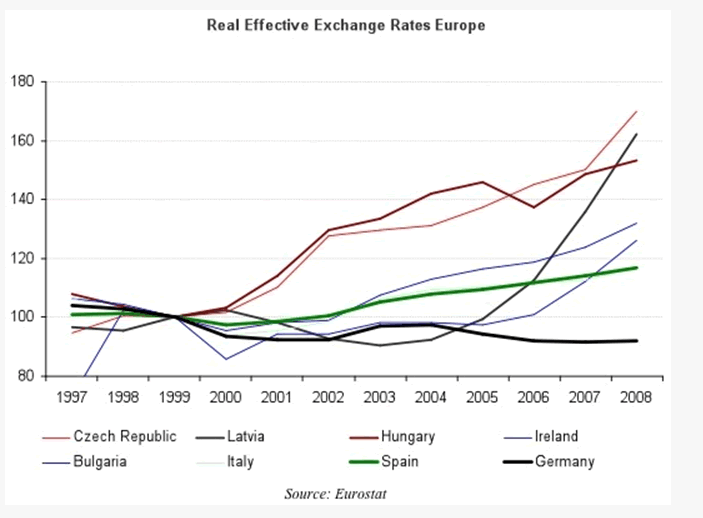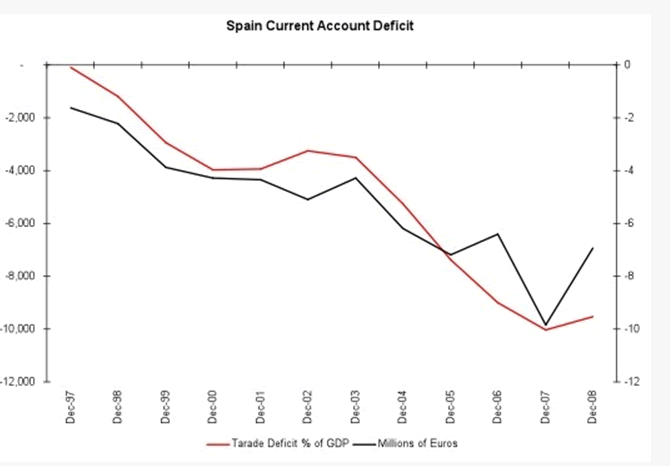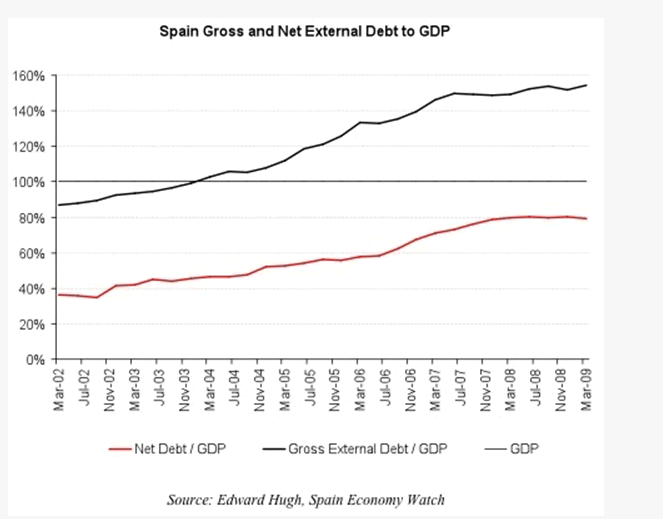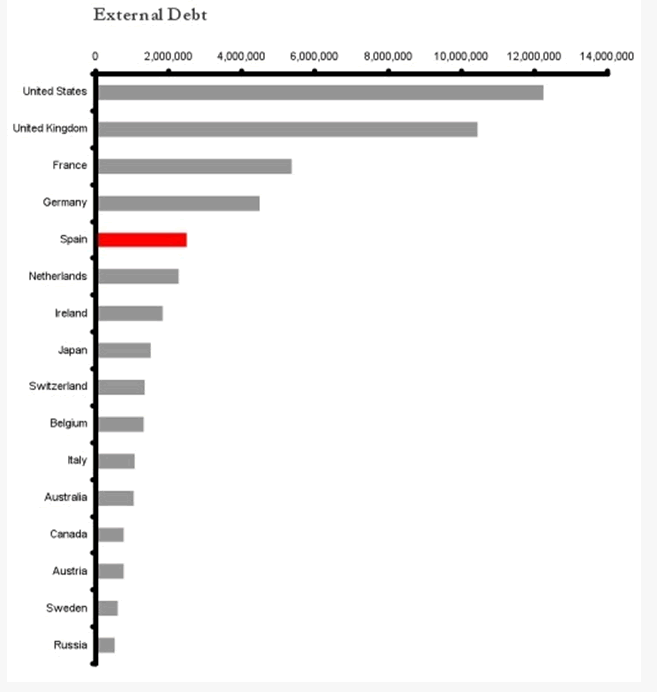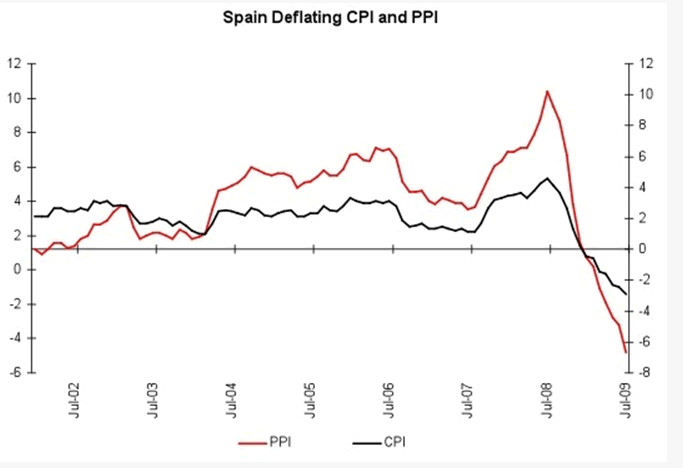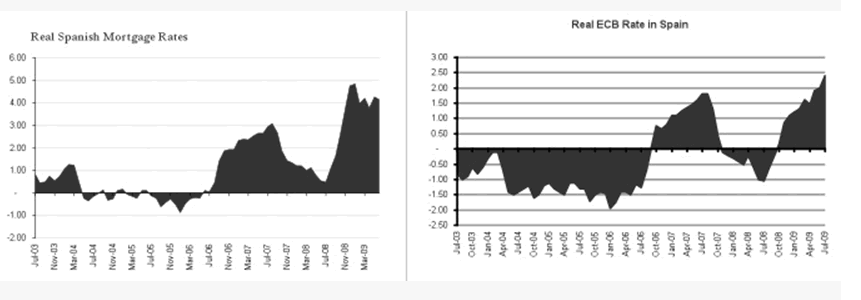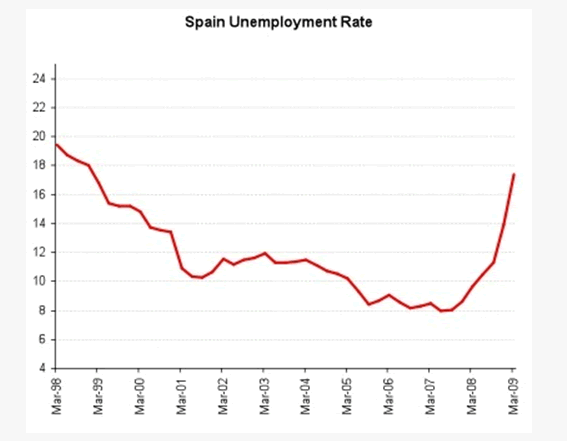Spain, The Financial Black Hole In Europe's Balance Sheet
Economics / Euro-Zone Sep 01, 2009 - 01:42 AM GMTBy: John_Mauldin
 Today's offering for this week's Outside the Box starts off with a quote from Titus Maccius Plautus: "I am a rich man as long as I don't pay my creditors." Even 2200 years ago, it seems that problems of credit were an issue.
Today's offering for this week's Outside the Box starts off with a quote from Titus Maccius Plautus: "I am a rich man as long as I don't pay my creditors." Even 2200 years ago, it seems that problems of credit were an issue.
I talked last Friday about the US being faced with a number of bad choices. But it is not just the US. Today we look at a piece from my friends at Variant Perception based on London. They are a relatively new institutional research house. I have been reading their material for some time and have begun to look very much forward to it. They do some very good in-depth analysis. I asked then to shorten a piece they did on Spain and Spanish banks for this week's Outside the Box. Spain will soon be faced with a number of very uncomfortable choices, but for now they appear in denial.
For those interested, I also provide a link to another report they did on the United Kingdom, tax collections (way down!) and the link to UK gilts (or bonds). It seems they also have a problem with issuing too much debt. http://www.variantperception.com/..
I have highlighted problems in Japan and with the European banking system. The problem from the credit crisis are world wide. To think they are not interconnected would be naiveté in the extreme. What happens in Japan and Spain and the US will affect your part of the world, some more than others. Today, let's look at Spain, which has as many unsold hoes but at one-sixth of the population, and these homes are on the books of banks at full price. I will let you read about the rest of the future train wreck that is Spain from Variant Reception (www.variantperception.com which has some other interesting sample commentary as well).
Choices indeed.
John Mauldin, Editor Outside the Box
Spain: The Hole In Europe's Balance Sheet By Variant Perception
Dives sum, si non reddo eis quibus debeo. I am a rich man as long as I don't pay my creditors. Titus Maccius Plautus (c. 254-184 BCE), "Curculio"
Themes
-
Spain = Japan 2.0? - We argue that 1) the real estate crash in Spain is worse than is widely believed, 2) Spanish banks are hiding their losses, and 3) investors are smoking crack if they believe that Spanish banks are among the strongest in Europe, (see Forbes latest Spanish Banks In Top Form). If all these are true, Spain will soon have zombie banks like Japan.
-
Banks are hiding losses - We believe that Spanish banks are not marking their real estate loans to market and are extending credit to zombie construction companies. They do this by 1) Getting a boost from accounting changes, 2) Not marking loans to market, 3) Continued lending to zombie companies, 4) Extending 40 year and 100% loan-to-value loans, and other bubble-like lending practices. We look at each of these in turn.
-
Spain is in deflation - In a deflationary environment, servicing debt becomes even harder. Even when rates go to zero the real burden of debt goes up. That is why deflation is such a terrible thing. Eastern Europe, Spain and Ireland are now all experiencing the beginning of deflation. We believe that we will see much more deflation to come, which will have broad ramifications across the European banking sector.
-
Who's holding the bag? - The periphery countries are net debtors, and the rest of Europe is the net creditor. When a debtor can't pay, the creditor suffers. Germany, France and others will need to cope with recapitalizing the periphery and Spain.
Strategies
We recommend shorting or being underweight Spanish government bonds vs German bonds and short equities, particularly banks, builders and anything related to the consumer.
Spain = Japan 2.0?
We hate to bang on about Spain like an old Salvation Army drum, but we believe that Spain is a disaster waiting to happen. Misunderstanding the severity of the crisis will prove costly to investors as it will have profound implications to the European banking system.
Spain is set for a long, painful deflation that will manifest itself via a very high unemployment level for an industrialized economy, a real estate collapse and general banking insolvencies.
Spain had the mother of all housing bubbles. To put things in perspective, Spain now has as many unsold homes as the US, even though the US is about six times bigger. Spain is roughly 10% of the EU GDP, yet it accounted for 30% of all new homes built since 2000 in the EU. Most of the new homes were financed with capital from abroad, so Spain's housing crisis is closely tied in with a financing crisis.
The impact on the banking sector will be severe. Consider this: the value of outstanding loans to Spanish developers has gone from just €33.5 billion in 2000 to €318 billion in 2008, a rise of 850% in 8 years. If you add in construction sector debts, the overall value of outstanding loans to developers and construction companies rises to €470 billion. That's almost 50% of Spanish GDP. Most of these loans will go bad.
Spanish banks, in our view, are now facing a very bleak outlook. Spain's unemployment rate reached over 17%; there are now four million unemployed Spaniards and over one million families with not a single person employed in the family.
We argue and will document anecdotally in this report that:
-
The real estate crash in Spain is worse than is widely believed, much as the subprime problem was much worse than people believed
-
Spanish banks are hiding their losses and rolling over debt to zombie companies, much as Japan did in the last decade
-
Investors are deluding themselves if they believe that Spanish banks are among the strongest in the world. (This is a new theme. See Forbes's latest "Spanish Banks In Top Form" for an example of the new fawning articles on Spanish banks.)
If we are right, Spain will soon have zombie banks like Japan and it will face a prolonged period of deflation. However, Spain will be much worse. As Edward Hugh, the doyen of clear-headed analysts of Spain, points out, "Japan in 1992 could leverage its own savings, it had a current account surplus of 3% of GDP. Spain has massive external debt - in 2007 the current account deficit was 10% of GDP - and little in the way of major export industries."
Putting Together A Mosaic
At Variant Perception, we try to stay away from writing too many words. Anything that cannot be explained with a few charts is most likely not worth explaining. In the case of Spanish banking's subterfuge and hiding of bad loans, we have had to assemble a mosaic of news pieces, interviews with banking insiders and others to piece together what is in fact happening. This reminds us very much of the early days of subprime where all the banking results looked good, until they didn't. We believe it will be the same with Spanish real estate.
The Situation In Spanish Housing Is Much Worse Than People Think
The standard line that most analysts buy about Spanish banks is the following:
-
Dynamic provisioning - In 2000, Spain's central bank introduced a system of "dynamic provisioning" that forced banks to build up reserves against future losses. Spanish banks reserved three to four times as much as most of their international competitors. In a sense, the Bank of Spain was building countercyclical buffers to prepare for an eventual credit crisis.
-
Prudent lending - The large private Spanish banks claim that their risk management led them to concentrate mortgage lending on primary residences in the cities at reasonable loan-to-value ratios, leaving lending to developers and buyers of second homes to the Cajas.
However, despite dynamic provisioning, in the recent rally, Spanish banks have been rushing left, right and centre to shore up their capital. They have mainly done so by tapping their clueless retail customers for investment in preferred shares. It is a good start, but we believe they still have not done enough.
The magnitude of the Spanish problem is staggering, and will overwhelm all the benefits of dynamic provisioning. Conservatively, Spain has over 1,000,000 unsold homes. Unfortunately, many of the homes are on the coast, and without a return of overleveraged British tourists, they are likely to remain unsold. Spain's homes are all in the wrong places.
Spain's building stocks bubble looks very much like the US bubble and other classic bubbles. It went up 10x and then went down 90%. The math is very simple.
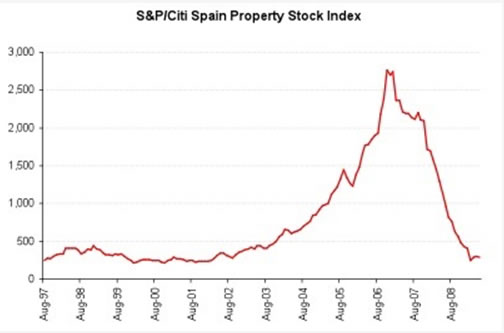
Given this woeful state of affairs, you might assume Spanish house prices had suffered like US house prices. This is not the case.
As the following chart shows, according to official statistics, Spanish house prices are down little more than 10% from their peaks.
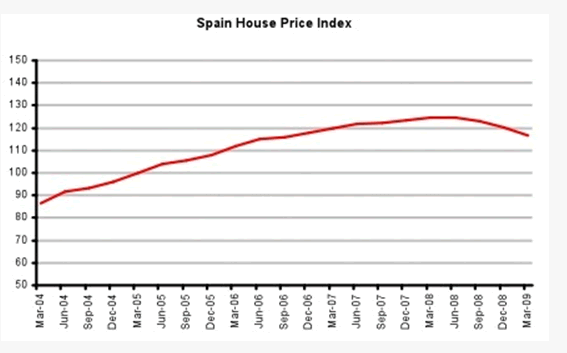
Why have Spanish banks not experienced the same fate as American, Irish and UK banks? We've often wondered how it is that our thesis for Spanish real estate and industrial collapse has not created more victims.
We believe that Spanish banks are hiding their problems. We explore how they are doing this through:
-
Getting a boost from accounting changes
-
Not marking loans to market
-
Continued lending to zombie companies
-
Making 40 year and 100% loan-to-value loans
Let's look at them in turn.
1) Getting a boost from accounting changes
The Bank of Spain is thought of as a very conservative, prudent institution. That is true, but it is now changing its tune. It must now be very concerned for the fate of some Spanish banks and some analysts estimate it will help them avoid posting losses this year.
In July the Bank of Spain changed its provisioning rules on risky mortgages. Previously, banks have made provision for the full value of loans above 80% of a loan to value ratio after two years of payment arrears. Following the new directives from the Bank of Spain, banks now only need to reserve for the difference between the value of the loan and 70% of the property's market value. For many Spanish banks, this has allowed them not to lose money this year.
Source: http://www.ft.com/cms/..
Source: http://www.economist.com/..
2) Not marking loans to market
We also believe that Spanish banks are not marking their books to market. According to an article from the 19th of April in Expansión, the Spanish equivalent of the Financial Times, entitled 'Spanish banks control half of all real estate appraisals.' , Spanish banks control 25% of appraisals directly and another 25% indirectly through their shareholdings.
In the words of Expansión:
The valuation of the guarantees of the mortgage book of the cajas and banks and of its real estate gains importance. The thirteen companies tied to financial entities represented 47% of all real estate appraisals in 2007.
The valuation of these real estate assets has taken on new importance for banks in the context of the current economic recession. The valuation of the mortgage guarantees and of the real estate assets they are taking on through the courts and debt for equity swaps is key to calibrate the solvency of the financial system. This situation has placed the focus once again on the links between banks and the real estate appraisers that goes beyond in many cases a mere commercial relationship.
Source: http://www.expansion.com/..
Official housing statistics are not corroborated by anecdotal evidence, web searches and the real estate sales by the banks themselves. According to a study by El Mundo, housing prices in many areas of the coasts have already dropped 30-50%.
Source: http://www.elmundo.es/..
Spain also confronts to problems of banks essentially taking on defaulted assets onto their books at the stated value of the mortgage. The following comes from a highly regarded foreign surveyor in Spain, describing what happened to a client who had run into problems:
On the banking side, he stated that one development had already been taken back by the bank. However, the bank had 'bought' the development from the developer for the price of the mortgage. Thus they had converted a non-performing mortgage into a property asset. However, the bank is now the owner of a development it cannot sell and is unlikely to for a number of years and has a debt of its own in the purchase price 'paid'. The banks are not experienced developers/property marketers and thus are building up problems for themselves, which must come to light at sometime, depending upon accounting practices. Alternatively, there is the potential that they are then bundling these discounted properties on to friends or holding property companies with notional loans and interest being rolled up until the property is sold.
Source: http://www.surveyspain.com/articles/asp-stats-comments.htm
3) Rolling over loans to zombie construction companies
In the last few weeks we've seen many Spanish property companies announce that they had refinanced their debt, which will postpone bankruptcy for a time. The latest to announce debt refinancing has been Realia, and before that Aisa, Afirma, Reyal Urbis, and Renta Corporacion. After the debacle of having to seize Colonial and Martinsa-Fadesa in 2008, Spanish banking stocks tanked and few Spanish bank executives want to see a repeat.
This lending to zombie developers will merely postpone the day of reckoning.
Banks have realized that instigating a bankruptcy process when builders can't roll their loans or sell houses isn't good for builders or for them. They now try to give as much rope to the builders as possible so that they don't have to report large defaults. In the words of a banking insider:
As soon as a small business becomes delinquent, even if it is a longstanding client, it is "everyman for himself" and everyone runs away as if he has the plague. But in the case of the big builders, the bank is fed up with taking on more assets and gives them a line of credit so that they can at least pay interests on their existing debts and give them room for two years to see if things fix themselves and if they can pay the loan back.
Source: http://www.cotizalia.com/cache/2009/08/02/noticias_96_pymes_solventes_credito_inmobiliarias.html
The willingness of banks to play ball with developers shouldn't come as a surprise. As they say in banking, "If you owe me a million, it is your problem. If you owe me a billion, it is my problem."
4) Offering 100% Loan to Value loans, 40 year mortgages and other bubble-like practices.
Spanish banks are now the largest real estate holders in Spain. They have come to own properties through many different avenues. In order to hide from the effects of the real estate crash, Spanish banks have been buying properties before the loans on them go bad and trying to dispose of them through their own real estate companies. They have also come to own dozens of thousands of homes through debt for equity swaps. Estimates put the value of property repossessed or swapped for debt by Spanish banks at about €16 billion.
Spanish banks have websites set up to move their stock. Among selling points are: pricing discounts of 25-50%, financial terms of Euribor plus 0% over 40 years, and guarantees to re-purchase the property in the future.
Source: http://www.elmundo.es/elmundo/2009/05/19/suvivienda/1242718086.html
The lending to Spanish developers has been institutionalized in agreements between the banks and the main developer's body, the Asociación de Promotores Constructores de España (APCE). Spanish banks will provide 40 year, 100% loan to value mortgages for any home that is discounted by 20% by a developer. The buyer has no need for a down payment. Santander signed such a deal with the APCE in order to reduce the stock of housing outstanding. This is another way to provide credit indirectly to zombie developers.
Source: http://www.elmundo.es/elmundo/2009/07/29/suvivienda/1248879035.html
What Is The Endgame For Spain?
As we pointed out in the last monthly commentary, Spain's problem is tied in with the problem of the entire European periphery. The boom years following the adoption of the euro provided 1) easy money via negative real interest rates, and 2) overvaluation of prices as measured by real effective exchange rates.
Spain, and the rest of the European periphery, can solve their problems either through massive productivity gains, which is highly unlikely, or through a reduction in wages and prices in the order of 20-30%, which is what will happen slowly and painfully. You could call such a reduction of wages and prices an "internal devaluation".
Such an internal devaluation will imply large losses to domestic banks and to external creditors. In the case of Eastern European countries, the damage will be bad, but not very large. In the case of Spain, writing off mortgage debt will be massive. We estimate that Spanish real estate losses will be over €250 billion when all is said and done. Clearly Spanish and foreign banks are unwilling to admit to the size of the problem and write off the debt. That is why the losses are being hidden.
Running large trade deficits is a form of dis-saving. Spain's large growth in consumption has had to be financed by the rest of Europe. Spain's trade deficit was among the highest in the world in absolute and relative terms at around 10% of GDP in late 2007.
Indeed, Spain's current account deficit at one stage was the largest in the world besides the United States in absolute terms. The Spanish economy acted like a giant consumer sucking up savings from the rest of Europe.
The high degree of consumption in Spain has mostly come from external borrowing and has not been financed out of existing savings.
How bad is that relative to other countries? Spain's external debt is extremely high in relative and absolute terms. It is among the highest in the world, the fifth largest:
Real Interest Rates: Deflation Is A *****
Eastern Europe, Spain and Ireland are now all experiencing the beginning of deflation. We believe that we will see much more deflation to come, which will have broad ramifications across the European banking sector. The periphery countries are net debtors, and the rest of Europe is the net creditor. When a debtor can't pay, the creditor suffers. Germany, France and others will need to cope with recapitalizing the periphery and Spain. In the words of Plautus, "I am a rich man as long as I don't pay my creditors." A deflationary spiral means that most of the debt will need to be written off, and the creditors will have to absorb the losses.
In a deflationary environment, servicing debt becomes even harder. Even when rates go to zero, prices and wages can go down faster and the real burden of debt can still go up. That is why deflation is such a terrible thing.
Spain now has negative CPI and PPI
Inflation in Spain has been negative for the last three months in a row. Spain has not experienced a similar decline in inflation like this in over 47 years. However, the Bank of Spain and the government are behaving like ostriches with their heads in the sand.
The problem with deflation is that even low interest rates are extremely high. Despite massive cuts by the ECB, real interest rates in Spain are still elevated due to negative CPI and PPI.
Spain is not the only country facing deflation. It is a problem for the entire European periphery. Ireland, for example, has the highest rate of deflation in the world. Prices in Ireland are falling at an annual rate of 5.9%, well ahead of the drops in other countries - only Thailand, at 4.4%, comes even close.
We believe that Ireland's experience is what Spain will see more of in the months ahead as the economy slowly adjusts to new realities. Almost all of Ireland's banks have been taken over by the government, and Ireland is struggling to decide how best to dispose of its bad assets. We believe Spain will be much more like Ireland than any of its European neighbours.
Oddly, even though inflation is negative, and unemployment is high, unions are still winning pay rises. Most wage agreements in Spain are reached through collective bargaining on an industry level. So far, wage increases are happening above the ECB's 2% target inflation rate. (It should come as no surprise that businesses try to get around wage bargaining. Last year almost five million jobs were temporary in Spain.)
Given how far out of line wages are with unit labor costs and the reality of deflation in Spain, we see Spain's unemployment level heading towards 25%. With a 25% unemployment rate and a debt deflationary dynamic, how exactly do the banks think they'll be paid back? Who will earn the money to pay the mortgage payments, and how will housing be affordable when wages have been deflated? Assuming the worst has passed in Spain does not pass the common sense test.
We believe Spanish politicians and international investors have grossly misjudged Spain, but events will force them to change their mind. In retrospect Spain will be viewed much like subprime where all the banking results looked good, until they didn't. This is typical of bubbles, and Spain will be no different.
By John Mauldin
John Mauldin, Best-Selling author and recognized financial expert, is also editor of the free Thoughts From the Frontline that goes to over 1 million readers each week. For more information on John or his FREE weekly economic letter go to: http://www.frontlinethoughts.com/learnmore
To subscribe to John Mauldin's E-Letter please click here:http://www.frontlinethoughts.com/subscribe.aspCopyright 2008 John Mauldin. All Rights Reserved
John Mauldin is president of Millennium Wave Advisors, LLC, a registered investment advisor. All material presented herein is believed to be reliable but we cannot attest to its accuracy. Investment recommendations may change and readers are urged to check with their investment counselors before making any investment decisions. Opinions expressed in these reports may change without prior notice. John Mauldin and/or the staff at Millennium Wave Advisors, LLC may or may not have investments in any funds cited above. Mauldin can be reached at 800-829-7273.Disclaimer PAST RESULTS ARE NOT INDICATIVE OF FUTURE RESULTS. THERE IS RISK OF LOSS AS WELL AS THE OPPORTUNITY FOR GAIN WHEN INVESTING IN MANAGED FUNDS. WHEN CONSIDERING ALTERNATIVE INVESTMENTS, INCLUDING HEDGE FUNDS, YOU SHOULD CONSIDER VARIOUS RISKS INCLUDING THE FACT THAT SOME PRODUCTS: OFTEN ENGAGE IN LEVERAGING AND OTHER SPECULATIVE INVESTMENT PRACTICES THAT MAY INCREASE THE RISK OF INVESTMENT LOSS, CAN BE ILLIQUID, ARE NOT REQUIRED TO PROVIDE PERIODIC PRICING OR VALUATION INFORMATION TO INVESTORS, MAY INVOLVE COMPLEX TAX STRUCTURES AND DELAYS IN DISTRIBUTING IMPORTANT TAX INFORMATION, ARE NOT SUBJECT TO THE SAME REGULATORY REQUIREMENTS AS MUTUAL FUNDS, OFTEN CHARGE HIGH FEES, AND IN MANY CASES THE UNDERLYING INVESTMENTS ARE NOT TRANSPARENT AND ARE KNOWN ONLY TO THE INVESTMENT MANAGER.
© 2005-2022 http://www.MarketOracle.co.uk - The Market Oracle is a FREE Daily Financial Markets Analysis & Forecasting online publication.




